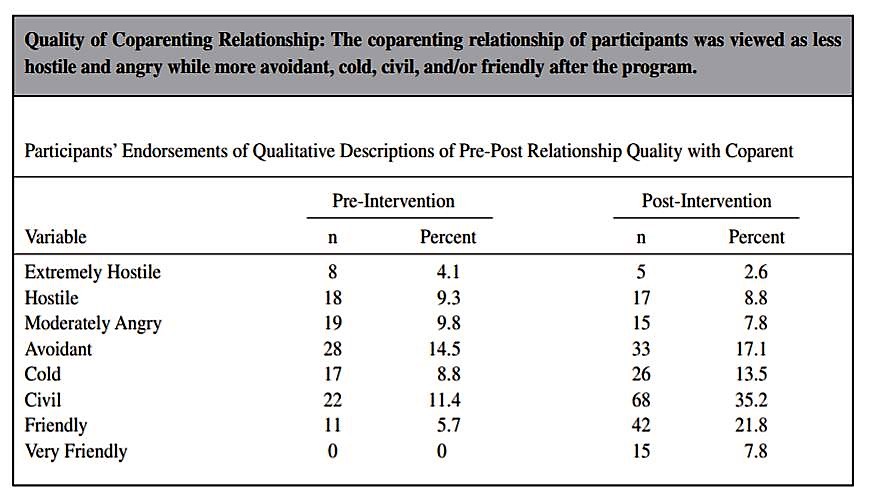Kathi A. Borden, Karin M. Hodges, George C. Tremblay
Antioch New England Graduate School
Joshua Lafortune
Jaffrey-Rindge Middle School
Abstract
Divorce is a stressful event that affects many children. With almost half of first marriages ending in divorce, and estimates that the majority of divorcing parents have children under the age of 6 (Maccoby & Mnookin, 1992) it is clear that this stressor impacts many children. As a group, children of divorced parents are at risk for a variety of psychological and behavioral problems. In his update of the Amato & Keith (1991) meta-analysis, Amato (2001) found results consistent with the earlier study: children of divorce have more problems with academic achievement and psychological and behavioral adjustment than do children whose parents have been continuously married.
More recent research has shown that parental conflict that continues beyond the divorce is one of the most influential factors in determining how a child adapts to a parental break-up. This has led to the development of programs for divorcing parents rather than children. These programs typically emphasize the impact of divorce on children, and are often brief (1-2 sessions). Few of these programs have been evaluated by independent evaluation teams.
Amato (2201) concluded that “the persisting—and apparently increasing—gap between children with divorced and continuously married parents suggests the continuing importance of developing and evaluating therapeutic and educational programs for divorcing families.” (p. 366) Cooperative Parenting™ and Divorce (Boyan & Termini, 1997) is one published and readily available program designed to address the needs of divorcing families. Lasting longer than most other programs, Cooperative Parenting™ and Divorce is an eight-session program, designed to help separated and divorced parents cooperate in their parenting responsibilities. Specifically, the program strives to improve communication and cooperation and decrease conflict with regard to parenting tasks rather than the overall relationship between parents. This poster summarizes an evaluation of the Cooperative Parenting™ and Divorce program.

Discussion
Results of this program evaluation indicate that the 8-week Cooperative Parenting™ and Divorce program was effective in meeting its goals, at least according to the self-report of participants. At the beginning of treatment, relationships between coparents were quite conflictual, often described as cold or hostile, and characterized by moderate anger. At the end of treatment, descriptors became more positive and less negative. In addition, parents were satisfied with the program, and reported improvements in their ability to interact as well as their actual interactions with their child’s other parent. While some may criticize the reliance on self-report for outcome data, at the very least parents gained knowledge about attitudes and behaviors that would be harmful, and those that would be helpful, to their children.
It appears that even an eight-week program can help parents develop relevant knowledge and skills to optimize their children’s adjustment to separation and divorce. By keeping the child at the center of a parent’s focus, parents are encouraged to develop communication and anger management skills that are helpful to their children’s adjustment.
The present study begins to address Grych and Fincham’s (1992) finding that little empirical work has been done to evaluate the effects of interventions for postdivorce families. Future studies might examine whether the longer time-frame is superior to more typical, shorter programs. Research might also focus on more objective outcome measures, such as future court appearances, or standardized measures of parent stress or child functioning. Finally, examining whether specific program components are more helpful than others, will aid in the further development of interventions for divorced or separated families.
Clinicians can benefit from learning to present the types of preventative interventions included in the Cooperative Parenting™ and Divorce program. Focusing on cooperating on coparenting tasks rather than on strengthening the overall relationship of divorced parents seems to keep parents open to the knowledge and skills they can learn in programs for divorced families.
